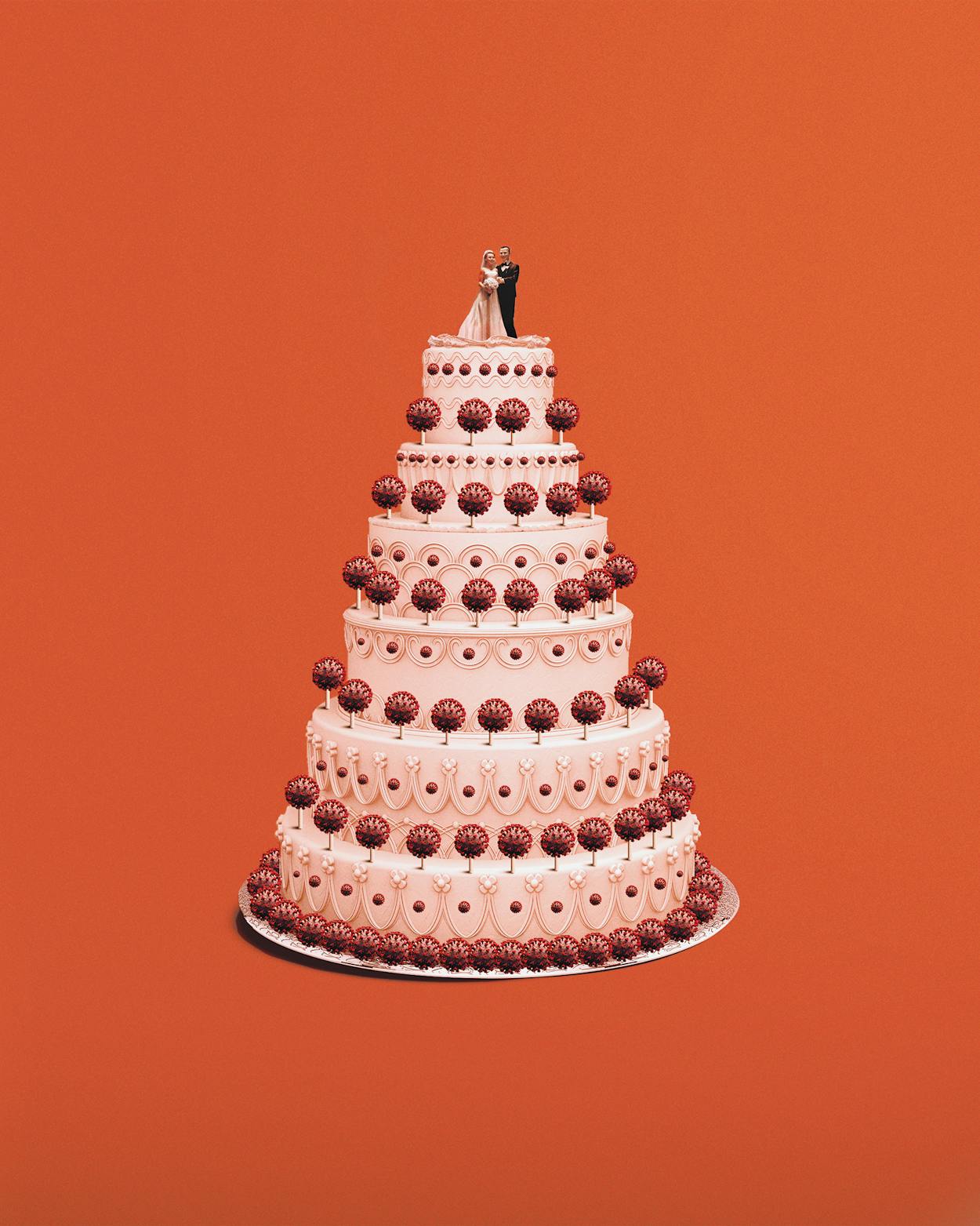The wedding photographer had already spent an hour or two inside the venue with the unmasked wedding party when one of the bridesmaids approached her. The woman thanked her for showing up, considering “everything that’s going on with the groom.”
When the photographer asked what she meant by that, the bridesmaid said the groom had tested positive for the coronavirus the day before. “She was looking for me to be like, ‘Oh, that’s crazy,’ like I was going to agree with her that it was fine,” the photographer recalls. “So I was like, ‘What are you talking about?’ And she was like, ‘Oh, no, no, no, don’t freak out. He doesn’t have symptoms. He’s fine.’ ”
The photographer, who has asthma and three kids—she wore a mask—left with her assistant before the night was over. Her exit was tense. The wedding planner said it was the most unprofessional thing she’d ever seen. Bridesmaids accused her of heartlessly ruining an innocent woman’s wedding day. She recalls one bridesmaid telling her, “I’m a teacher. I have fourteen students. If I’m willing to risk it, why aren’t you?” The friend of the bride who’d spilled the beans cried about being the “worst bridesmaid ever.”
In the days after the event, the photographer canceled her Thanksgiving plans with family, sent her kids to relatives’ houses so they wouldn’t get sick, and informed the brides of her upcoming weddings that she’d be subcontracting to other shooters. A few days later she started to feel sick and, sure enough, tested positive for the coronavirus. She informed the couple. “But they didn’t care,” she told me. Initially, she says, the couple refused to pay her the second half of her fee, since she’d left early. They also didn’t offer to compensate her for the cost of the test she’d taken, which she felt was the least they could have done; they didn’t even apologize for getting her sick.
Weddings are complicated events, and overhauling plans to accommodate the pandemic, as many have had to do, is no simple task. Celebrations must be moved to outdoor venues, guests must be uninvited, and vendors who are comfortable working at events during a public health crisis must be found.
To those not already mired in the planning process, canceling or postponing a wedding might seem like the obvious solution. But couples who choose to push their weddings to a date in an uncertain post-pandemic future must take into account the schedules of the venue, the caterers, the bartenders, the DJ, the florist, the photographer, and many other cogs in the wedding machine, all of whom are coordinating schedules with a dozen other couples trying to plan what should be the best day of their lives in what is likely one of the worst years of their lives. And rescheduling a wedding is not just a logistical nightmare: deposits are at stake.
The question of whether to reschedule is also an emotional one for many couples. “Postponing a party is one thing,” one photographer told me. “Postponing getting married is another.” Maybe that’s why so many couples are moving forward with their plans, telling themselves that it will be fine; if other people are doing it, why not them?
Many Texas couples have rescheduled and / or significantly downsized their guest lists. They made adjustments when Governor Greg Abbott said wedding venues could hold events only at 50 percent capacity (now 75 percent in most counties). But in many cases, that just meant that what was once a 500-person wedding became a 250-person wedding. And even at much smaller weddings, precautions quickly fell by the wayside.
One quick spin around the frenzied dance floor that is the Instagram hashtag #texaswedding reveals hundreds of photos of recent nuptials from across the state. In these photographs, there are usually neither masks nor Purell pumps, nor any other visual indication that the celebrations are taking place amid a global pandemic. Some events do seem safer than others—they take place outside, and they’re small—but it doesn’t take long to find a carousel of images of a wedding with a two-dozen-person bridal party and a bustling (and maskless) indoor reception.
Wedding photographers find themselves in a tight spot. They need to shoot weddings to make a living, but that means consistently spending time in large groups. All the photographers I spoke with said they carry hand sanitizer and wear masks when they’re working, and some even double up with face shields. But photographers can’t do much, if anything, to enforce any pandemic guidelines once they get to the wedding.
“I think most people’s intentions are good,” said one photographer, who, like all who shared their stories, asked to be anonymous because she didn’t want to risk losing more work. “It’s just when you get a group of people together with alcohol and socializing; at a certain point, everyone just kind of lets loose, and it gets a little dicey.” She recalls one event when the groom approached her at the end of the night, shouting his gratitude over the DJ’s music. “He was excited and happy and saying thank you,” she told me, “and I just felt spit land on my face.”
Photographers’ experiences shooting weddings during the pandemic have run the gamut. Several described couples who were cautious, respectful, and understanding. But many were not. “I would say about fifty percent of the weddings I’ve shot, there’s been no masks at all. It’s like we’re living in the pre-COVID parallel universe,” one photographer told me. “I’ve been in hotel ballrooms inside and it’s been packed like sardines and everyone’s having a great time. No one’s wearing masks. I’m there as the photographer documenting the reception, and there’s sweat flying and it’s hot and the music’s blaring and the fan’s on and I’m just like, ‘Well, the odds are that one of every ten people here have COVID and don’t realize it.’ ”
One now-disillusioned photographer shot a wedding in South Texas with roughly three hundred guests, including one who told one of the photographer’s assistants, “Oh, you don’t have to wear a mask. You don’t have to worry. None of us have the ’rona.” During the reception, hundreds of guests lined up for a non-COVID-compliant group dance. The guests, old and young, arranged themselves for a grand march (a traditional wedding dance), and the photographer was horrified to see “tunnels of people running through with each other, high-fiving and yelling at each other and touching.” The photographers and catering staff, she says, were the only attendees who seemed to be taking precautions. “Not even the bartenders were masked,” she told me.
Another photographer, also sounding a bit incredulous, described a wedding where at least six out of the fourteen or so people in the bridal party ended up testing positive. “I’m pretty certain there were people in the wedding party who just didn’t get tested because they didn’t feel any symptoms,” he said.
At other weddings he’s worked, he said, guests in their eighties and nineties have walked around maskless. “I saw a guy with an oxygen machine. He was carrying around an oxygen machine to breathe, but he didn’t have a mask on.”
The photographer who got sick after shooting the wedding of the COVID-positive groom said her experiences have left her a little depressed. “It has been crazy to see people’s true colors,” she says.
Fearing a legal battle, she recorded some conversations she had with bridesmaids and guests that night, surreptitiously taking a video with her cellphone. The only visuals are the murky insides of her jacket pocket, but the audio is clear, and the tension is palpable, as voice after voice accuses her of overreacting to the groom’s positive test.
“Wow,” one woman says to the photographer, her tone disdainful, “you sure know how to make people feel like they’re nothing.” A bridesmaid chimes in: “What is the problem?”
The photographer gets audibly upset. “I don’t know why you’re screaming,” one member of the wedding party tells her. “Because I could die,” says the photographer. “My children could die! Just so she could have her wedding day?”
This story was published online on December 21, 2020. It also appeared in our March 2021 issue and has been updated to reflect additional reporting.
Read more stories from the pandemic:
He Hoped Sheltering in Place Would Save His Marriage. Instead It Led to Divorce.
With Salons Closed, an 89-Year-Old Houston Woman Washes Her Own Hair for the First Time in Decades
A Prepper Community Near Terlingua Is Ready for Just About Anything
I Live in the Middle of Nowhere. I Still Got COVID.
- More About:
- Pandemic









